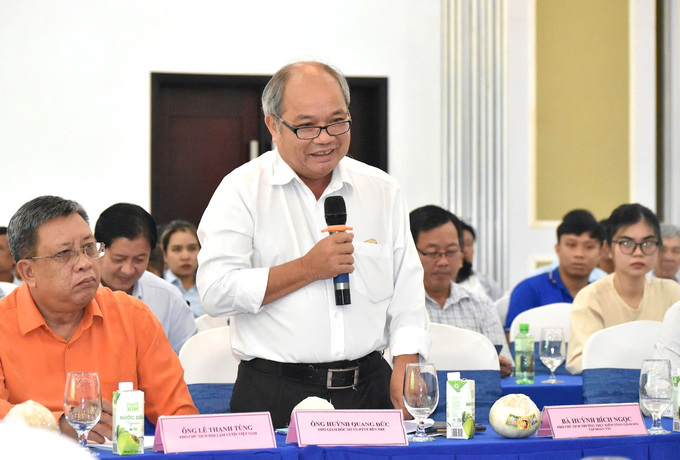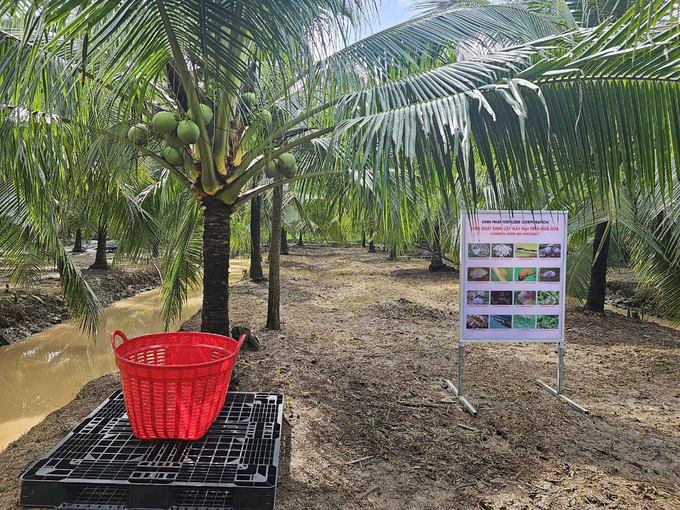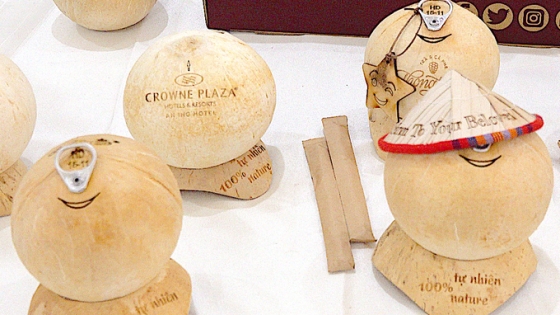(VAN) Ben Tre province is home to 133 coconut plantation codes, which span an area of more than 8,300 hectares. Additionally, 14 enterprises have been certified with packaging codes for the exports of fresh coconuts.
Deputy Director of the Department of Agriculture and Rural Development (DARD) of Ben Tre, Mr. Huynh Quang Duc, stated that Ben Tre is the “coconut capital” of Vietnam, with a plantation area that exceeds 80,000 hectares, during the forum on “Connecting Coconut Production and Consumption.”
The coconut area of the province is responsible for 88% of the coconut plantations in the Mekong Delta and nearly 42% of the country’s total. More than 200,000 rural households in the province rely on the coconut tree as a primary source of income and a prominent crop. The Ben Tre green coconut has been granted national geographical indication certification and is registered for trademark protection.

Mr. Huynh Quang Duc, Deputy Director of Ben Tre Department of Agriculture and Rural Development, shared solutions for organic coconut farming and management of codes for coconut growing areas for export. Photo: Minh Dam.
Ben Tre has designated 133 plantation areas with unique codes, which collectively span more than 8,300 hectares, to date. Fourteen enterprises have been granted packing codes for exporting fresh coconuts to the Chinese market. Annually, coconut exports generate over USD 350 million for the province.
In recent years, the Department of Agriculture and Rural Development has worked together with local authorities and other relevant agencies to establish organic coconut plantations that span more than 20,700 hectares. The export of organic coconut products to a variety of markets, such as the U.S., EU, Japan, China, and South Korea, has been facilitated by the establishment of a closely linked value chain that includes eight major enterprises that are equipped with contemporary processing technologies.
Ben Tre has incorporated coconut development into the provincial resolutions and plans in order to effectively manage plantation and packing codes and cultivate organic coconuts, according to Mr. Duc. Linking production channels is the cornerstone of coconut development. These chains form a unified effort that involves political systems, enterprises, and producers as they expand.
Concurrently, the province has improved the transfer of technical processes, conducted training seminars to enhance knowledge of regulations, and provided technical solutions to ensure that farmers and enterprises comply with import regulations when registering plantation and packing codes.
Furthermore, Ben Tre has led plantations and packaging facilities in the comprehensive updating of information in the National Database on plantations and packing facilities for export. In order to satisfy the data requirements of importing countries, farmers and enterprises are advised to implement software such as “field journals” and “packing facility management.”

Coconut production, packaging and export units must strictly comply with food safety regulations and plant quarantine procedures mentioned in the Protocol and related regulations. Photo: Minh Dam.
It is also recommended that producers, packers, and exporters rigorously comply with the food safety regulations, quality standards, and phytosanitary procedures as outlined in pertinent protocols and regulations. In addition to enhancing the quality of coconut products, adherence to these protocols also facilitates access to additional international markets.
Simultaneously, the province is intensifying trade promotion initiatives, supply-demand connections, market surveys, and assistance for local businesses to participate in trade exhibitions both domestically and internationally. It is also modernizing trade promotion methods by leveraging IT applications, digital transformation, and e-commerce, particularly by establishing connections with global platforms like Alibaba and Amazon.
Additionally, Ben Tre is fostering close partnerships with ambassadors and trade counselors to facilitate investment and establish connections with countries that require its products.
Agriculture News | Agri Products Price



